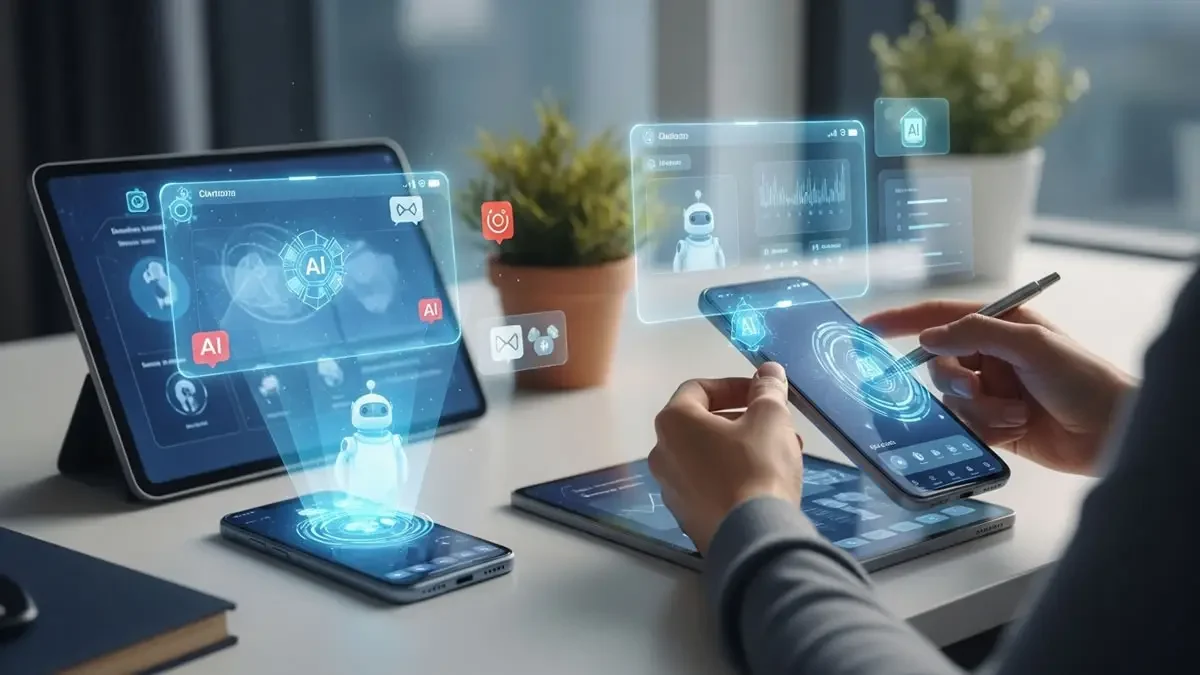AI is no longer just an upcoming perception; It has developed into an indispensable part of our everyday digital lives. Today, apps alter these apps as we interrelate with technology, and make ordinary responsibilities smarter, sharper, and additional comfortable.
From efficiency tools to entertainment stages, AI-controlled applications have been redesigning users’ work, play, and messaging. Understanding the achievement of AI in apps is essential for individuals and companies who poverty to stay gaining in the rapidly emerging digital world.
AI in Apps for Productivity
AI in Apps has revolutionized the productivity tool, which helps users manage tasks effectively. AI-run smart planning apps can automatically get optimal meeting times, reduce conflicts, and save time. Similarly, the AI Email messages in apps help by preparing, prioritizing, and even preparing reactions in email administration.
Document editors have combined AI into apps to deliver smart proposals, grammar developments, and automatic semination features, so that specialists can focus on expressive work in place of repeated responsibilities. By incorporating AI into apps, users can increase competence, reduce manual exertion, and accomplish high efficiency levels in both their individual and specialized lives.
Enhancing Entertainment with AI in Apps
The entertainment field sees a major change for AI in apps. Streaming platforms now use the AI manual recommendation engine to suggest music, movies, and videos based on personal preferences. This individual approach finds users the materials that match their taste. AI in APS also supports creators through automatic video editing, audio mixing, and content optimization tools.
Game apps benefit from AI in apps by offering adaptive games, which change the player’s behavior and skill level. This personalization level makes entertainment more engrossing and attractive to users, revealing the transformational power of AI in Apps.
AI in Communication Apps
Communication apps with AI in APS have also developed greatly. AI -Run Chatbots provides immediate support and helps users solve questions without waiting for human intervention. Real-time translation features are now possible due to AI in apps, which can initially communicate in a language.
Message apps have another example of AI in predictive text and smart note-taking apps, which make communication sharp, smooth, and more efficient. This AI integration not only improves the user experience but also promotes better global connection and collaboration.
AI in Apps for Health and Lifestyle
AI in apps is no longer limited to productivity or entertainment; It is used quickly in health and lifestyle apps. AI-operated training apps can track user activity, monitor health matrix, and create individual training plans. Nutrition app uses AI in apps to suggest food plans based on dietary settings and goals.
Mental Health apps benefit from guidance, mood tracking, and individual recommendations from AI. The increasing presence of AI in apps in these areas suggests how versatile and effective AI technology has been in everyday life.
The Future of AI in Apps
The future of AI in apps promises even more innovation. Generative AI can now help apps help apps, automated processes, and even app development. Voice and image recognition become standard features, making apps more comfortable, safe, and interactive.
Hyper personnel apps allow apps to be suitable for user time, and provide a very adapted experience that was once impossible. As AI goes on in apps, users can expect smart, more futuristic, and highly responsible applications that estimate the needs and provide action-rich insights.
Examples of AI in Apps Today
- Productivity Apps: Microsoft 365, Google Workspace, and Insight Apps participate in APS to adapt the system, automate errands, and upsurge collaboration.
- Entertainment Apps: Spotify, Netflix, and YouTube employ AI apps to stretch references constructed into the apps.
- Health Apps: Fitbit, MyFitnessPal, and Headspace use AI in apps for individual fitness and mental well-being guidance.
- E-commerce Apps: Amazon, eBay, and Shopify apps use AI in apps to forecast customer behavior, suggest foodstuffs, and upsurge shopping knowledge.
These examples show AIS’s widely intelligent applications and the ability to change industries in the apps.
Conclusion
AI in apps is no longer optional; it is important for productivity, entertainment, communication, and lifestyle. By making apps smarter, more comfortable, and personal, AI takes in apps again in the way we interact with technology. Being informed of AI in apps allows users and businesses to make use of this technique effectively and ensure that they remain competitive and effective in the digital world in 2025.


